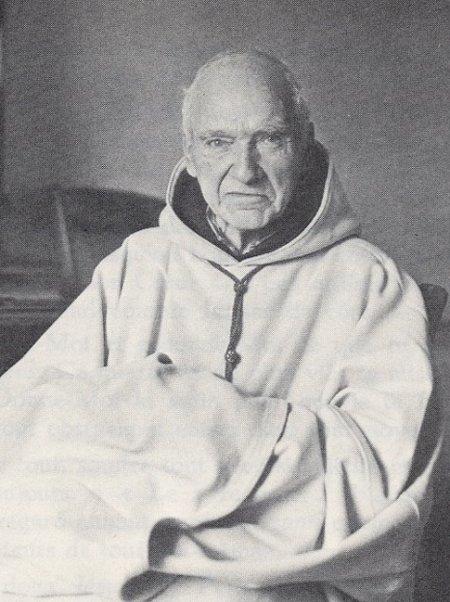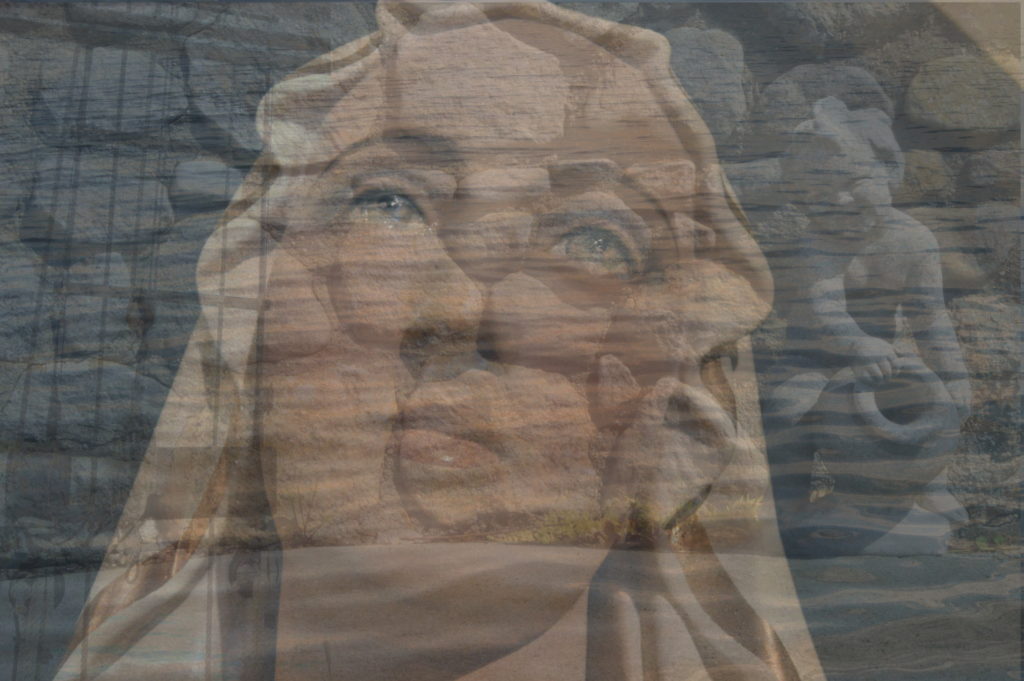…to abandon the former kinds of prayer too soon. So long as my convictions are not as yet deep, nor my detachment sufficiently marked, I have need that the patient and preserving action of considerations should make the light shine forth in my soul, should disengage my heart from created things, and excite it to acts of divine love and generous resolutions. When badly prepared for this prayer of simplicity, I cannot succeed in it. I am then like a schoolboy advanced to a class that is too high for him. –- ‘The Ways of Mental Prayer’
‘The Ways of Mental Prayer’
Abbot Vitalis Lehodey

Boats out on the horizon
The light has come, the convictions are well founded, the evidence is such, that the things of God are perceived almost as we perceive first principles; we remember, we look, we attend, and this is enough. This does not hinder this view from being sometimes more luminous, sometimes weaker and more veiled. By its very nature it is somewhat obscure and confused, because it proceeds mostly by way of general views, not stopping at details, pretty much as we take in at a single glance a whole landscape. –Rev Dom Vitalis Lehody ‘The Ways of Mental Prayer’


Adoration refined
“Sometimes the whole soul concentrates herself within herself, and is buried in a profound silence; the admiration she is in, at what she feels and what she beholds, stifles her voice and prevents all speech; the astonished spirit keeps the senses suspended, and can only by her sighs convey to God the fervor of her desires.” The mind then remains fixed upon God, whose presence it feels; leaving reasoning aside, it keeps silence and looks with admiration; it enfolds its Well-Beloved in one long look, which, without any words, says a great deal, because it expresses the astonishment, the Joy, the charm, and the love by which the soul is fascinated. The will, plunged in God, inflamed by its union with God, expanding itself in God by a fusion full of sweetnes is not inclined to formulate a multitude of acts. It is enjoying God in a union that is calm, tranquil, and full of unction. It is reposing deliciously on the bosom of its Divine Master in a silence full of love. The whole soul, like to a mother who devours her infant with her eyes, passes into this ardent look. The more she contemplates, the more she is inflamed. The more she is inflamed; the more pleasure she takes in contemplating. She loves without saying so; but the fire of her eyes, her tears, her sighs, her attitude, the dispositions of her heart, the immobility of her astonishment, the discreet outburst of her tenderness, all speak with eloquence and ravish Him who is charming her. The intellect and will remain silently occupied with God, often during a somewhat long time; some simple and ardent acts, at the most, are made by the heart, just what is needful to sustain this loving Union. –Father Dom Vitalis Lehodey ‘The Ways of Mental Prayer’


Spiritual deconstruction
There can be no greater or livelier faith than to believe that God is managing our affairs with admirable wisdom and love when he seems to be destroying and annihilating us, when he frustrates our holiest designs, when he exposes us to calumny, obscures all our lights in prayer, dries up our devotion and fervor with aridities, ruins our health with infirmities and languors, reduces us to incapacity for doing anything at all. –Abbot Vital Lehody

Sweet and sour consolations
Sensible devotion and particularly spiritual sweetness are very precious graces. They inspire us with horror and disgust for the pleasures of the world which constitute the attraction of vice. They give us the will and power to walk, to run, to fly along the ways to prayer and virtue. Sadness contracts the heart, while joy dilates it. This dilation helps us powerfully to mortify our senses, to repress our passions, to renounce our own wills and to endure trials with patience. It urges us to greater generosity and more lofty aspirations. The abundance of divine sweetness makes mortification a delight and obedience a pleasure. We rise promptly at the first sound of the bell. We miss no opportunity for practicing virtue. All our actions are done in peace and tranquility…. Saint Francis de Sales, sweet consolations, ” excite the appetite of the soul, comfort the mind, give to the promptitude of devotion a holy joy and cheerfulness which render our actions beautiful and agreeable”….
With regard to aridities, observe, first of all, with St. Alphonsus, that they can be either voluntary or involuntary. They are voluntary in their cause when we allow our minds to become dissipated, our affections to attach themselves to created things, our wills to follow their caprices and consequence we commit a multitude of little faults without making an effort to correct them. It is no longer a case of simple dryness of sensibility, it is languor of the will. “This state is such,” says Saint Alphonsus, “That unless the soul does violence to herself in order to escape from it, she will go from bad to worse. God Grant she does not fall after a time into the greatest of misfortunes! This kind of aridity resembles consumption, which never kills at once, but infallibly leads to death”. We must do all that depends on us to get rid of it. If it persist in spite of our efforts, let us accept it resignedly as a merciful chastisement of our faults. Involuntary dryness is that experienced by one who is endeavoring to walk in the ways of perfection, who guards against all deliberate sin, practices prayer” and faithfully discharges every duty….
Spiritual aridities and sensible desolations constitute an excellent purgatory where we can pay our debts to divine justice on easy terms. Still more truly can they be described as the crucible designed for the purification of souls. From an abundance of heavenly favors, the soul derives the courage to detach her affections from earthly objects and attach them securely to God.
–Abbot Vital Lehodey

Pride and impatience
Bitterness and vexation at what humbles us are simply the workings of pride, just as bitterness and vexation at what hurts us are the fruits of impatience. –Abbot Vital Lehodey


Repose into the Ordinary
After a strong contemplative declaration posting, my first studies led to cautionary reading. In the past, I abused the spiritual life through escapism. Unable to cope with the world, unable to truly humble myself, suffering from the existential neurosis of feeling misunderstood, adrift and self-deceived as different, I shunned the world. Wounded, broken and hurt, I isolated. Meditative prayer is a natural tendency, a place I easily recede to. I can sit silent, quiet before the Eucharist hour upon hour. However, there is a perverse form of selfishness through such efforts. What I read by Abbot Lehodey, declared personal concerns.
“Repose and tranquility are eminently conducive to regular observance and the interior life. They give us an opportunity of attending at leisure to our own souls and of keeping ourselves uninterruptedly united to God. We may become inordinately attached to them, so that we feel a certain difficulty in renouncing them when we have to fulfill the duties of our office or devote ourselves to the service of the community. The love of repose and tranquility, very legitimate in itself, is then excessive, has degenerated into a selfish egoism. It is no longer disinterested or devoted. Consequently, it extinguishes the flame of true charity and renders us useless alike to ourselves and to others”. –Abbot Vital Lehody
For myself, the difficult part is working within the world. There lies my true challenge: to abstain from alcohol, to be small, humble, and happy with and in the world. To dialog, interact, to be open and giving, equates to spiritual effectiveness. Over the last several months, I have returned to playing basketball at fifty with a remarkable group of men over sixty. Intensely, twice a week, every week, we compete on the basketball court like teenagers. The competition, camaraderie, and exercise have become essential to my well-being. The natural life is where my spiritual life can expand or stagnate. Remaining unattached, I vigorously make myself vulnerable to my surroundings, delighting in humiliation and struggle rather than glorification and advancement. Answers to real life problems, not to be a character, extreme, weird or awesome, not to withdraw and isolate while not seeking attention, to reveal practical solutions, contentment in consistency through routine and schedule, to live an ordinary life through ordinary achievement is where my spiritual life is truly nurtured.
A dear friend always stresses that the spiritual life is not my challenge. The natural life is where my deepest battle exist, where ultimate victory is to be attained. Ordinary life is very difficult for me. In my young adulthood, I thrived in dramatics, chaos, and efforts of grand artistic statements. Everything had to be sensational and orientated toward grandness. Restless, irritable, and discontented, life was boring, while lived to the extreme, an existential puzzle manipulated by my schemes and dreams, accountability never a factor due to my unique status as a man of distinct credible insight. Yet strangely through all those years of self-negating, figuring out who I was not, I loved God. I truly did. Misguided, it was not of my doing. All glory goes to God. I will also note Our Blessed Mother truly watched over me, tolerating my wandering, making herself known in a manner I could never refute. She never allowed me to immerse myself too deeply or irretrievably into mortal sin. She assisted in establishing decades of chastity, purifying in areas I was willing to engage temptation. Left to my own devices, I would have wrecked havoc onto my soul, complexly for the sake of experiencing the world as an intellectual artist. I can never deny Her, eternally I am Her’s. The Queen of Heaven is powerfully majestic and tender, a mightily merciful dispenser of grace.
Lyrics from a rock song, ‘The Wake Up Bomb’ by REM come to mind. Astray, a dangerous mind wounding himself in an effort of trying too hard at things that should never be achieved-he stomps, sings, and dances about in places angels fear to tread, and still, reflecting, Michael Stipe possesses a soul wrenching ability to express himself. Something I am convinced of regarding the modern artistic mind is its embracing of the ideology that the end justifies the means. A pop culture icon like Jimi Hendrix is revered when in truth his life is a tragedy, possibly leading to eternal damnation. We are more than children playing with the gift of life. I am always marked by the fact that walking through a museum the artwork becomes grotesque, lacking beauty, complex and convoluted as one advances in centuries. The more we center into the modern mind the more everything beautiful is destroyed. Observe the popularity of piercings and tattoos, the level of ugliness individuals are willing to descend to in order to be unique, to establish an identity. In modern times, it is conformity to be different and extreme. Everybody is doing it. Satan runs riot in the modernistic mind. Beauty and artful presentation give way to self-conscious individual attempts at revelation. It is more important to be somebody, rather than to become something authentic and profound. If one’s creative effort destroys one’s peace of mind, the state of the soul, one’s appreciation for true beauty, all is for naught, simply glorified exercises in errant behavior, a perversion. The idea of genius being tortured, Van Gogh cutting off an ear, is a perversion of ideology, perilous for self-conscious ambitious sensitive immature minds. It is a personal conviction, yet I am of the mindset that self-consciousness is even more dangerous than pride. So many are ecstatic to be famous when they should be content with being nobody. The overwhelming desire to establish identity annihilates. The truth may be the two, pride–the greatest of sins and self-consciousness, are so closely intertwined lines of demarcation do not exist. The recovery world perfectly tags the cliche: ‘ego maniac with an inferiority complex’ Self-consciousness is living in a state of insecurity, low self-esteem that forces one to be in constant collusion with the world. If one attains power under such aberrant conditions they only become more confusion in a confusing world. The noise level only increases. It is evident in religious circles, amongst those striving the most strenuously toward holiness, the obstacle self-conscious individuals present. Prevalent in attack mode minds, these individuals instantly criticize others, desiring to prove how wrong others are, or more accurately trying to establish their righteous identity by the smashing of all other identities. Opposite of submitting to trust, reliance upon Divine Will–faith, hope, and charity; honest, open, and willing when sharing with others, willing to be wrong, self-conscious individuals are forced to struggle with the infliction of personal will. If those I support and encourage are only those who promote my delusion I curse myself. That all said here are Michael Stipe’s lyrics.
I had to knock a few buildings over
I make an ugly mess
I had to blow a gasket
Drop transmission
I had to decompress
I had to write the great American novel
I had a neutron bomb
I had to teach the world to sing by the age of 21
I wake up (I wake up)
I wake up (I wake up)
I threw up when I saw what I’d done
As I celebrate extraordinary achievement through the astonishing Philippe Petit, let me also reign matters in, by recognizing my need to settle lovingly, comfortably within the ordinary. My friend, Ann Marie, always points out that Saint John of the Cross, my dearest saint, was known as an ordinary religious, unassuming in appearance with his diminutive size. A man I saw as the mystics of all mystics was in daily appearance and behavior a very ordinary man. A man who experienced within himself the superessentially extraordinary was in all practical matters extremely ordinary.



Recent Comments